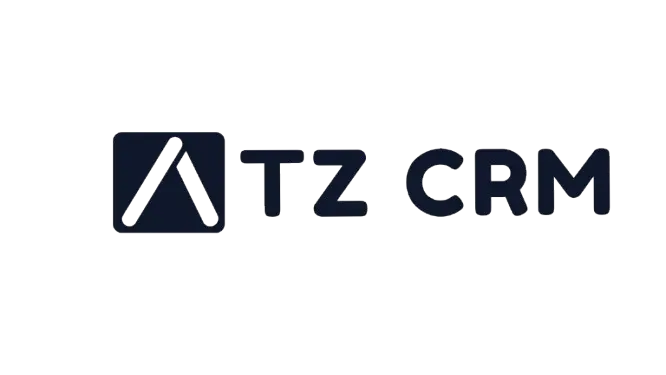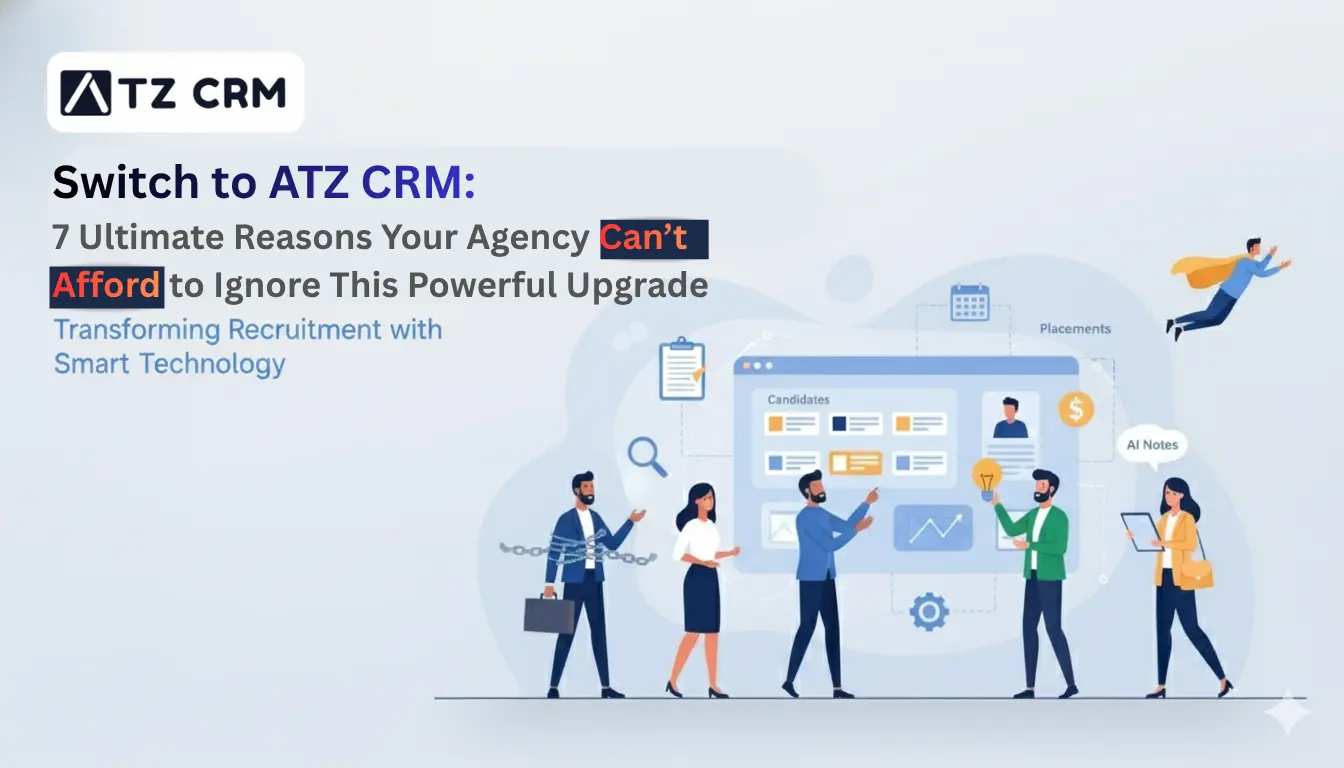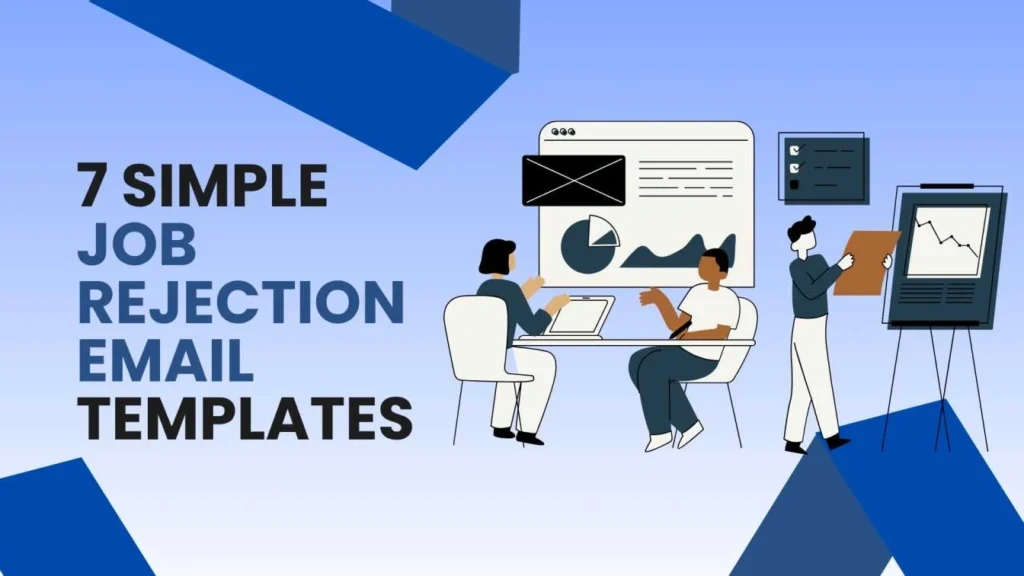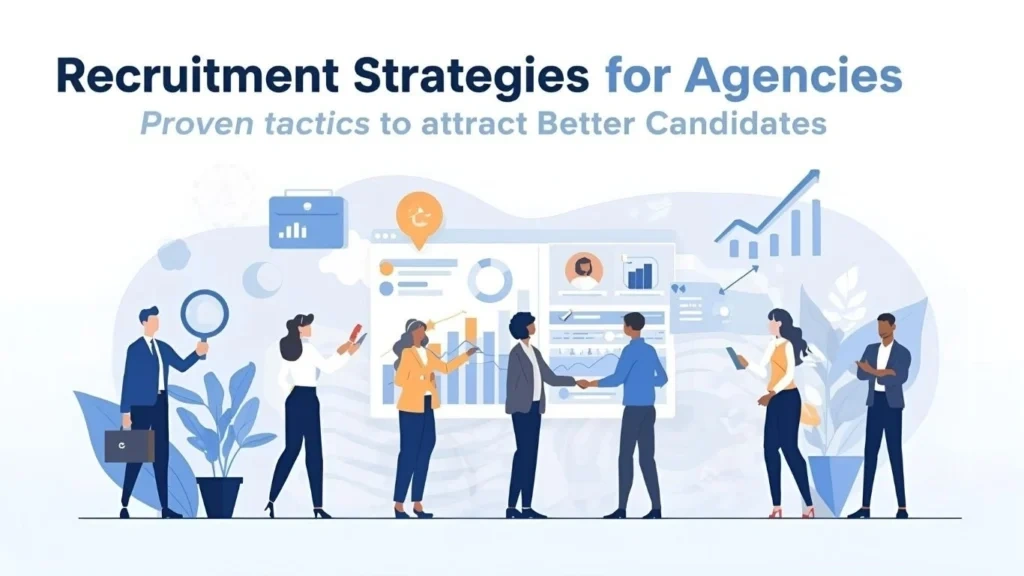· Recruitment · 9 min read
Customer Relationship Management 101: Everything Important You Need to Know in 2025
Customer Relationship Management is changing fast. Discover 2025’s most powerful CRM trends reshaping sales, customer loyalty, and business growth.
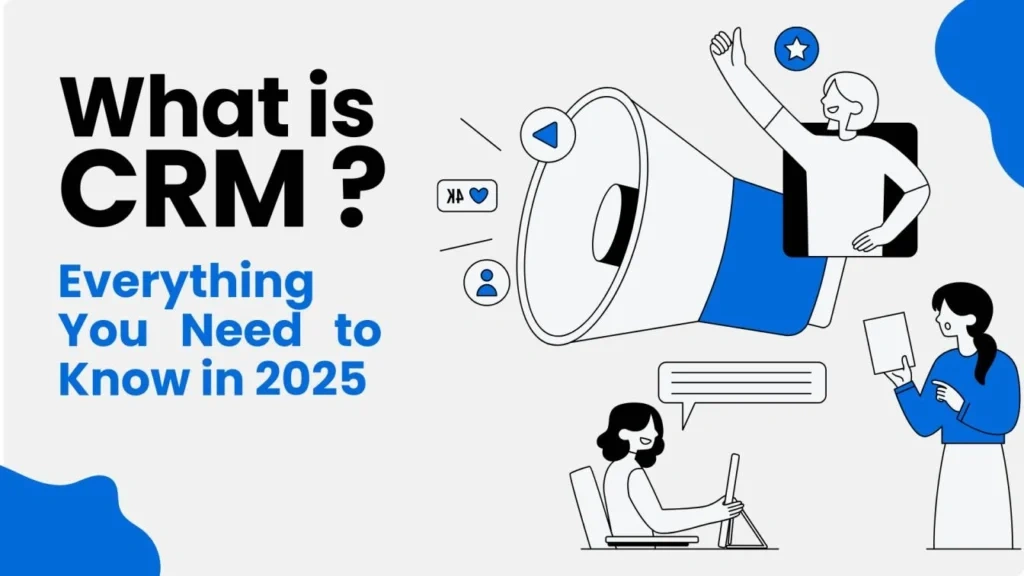
Introduction
Business in 2025 isn’t just about making transactions anymore. It’s about building genuine relationships with your customers because let’s face it, loyal customers are the backbone of any successful company. They buy more, they stick around, and they’re your best marketing when they start spreading the word.
That’s why Customer Relationship Management, or CRM, is a big deal. And we’re not just talking about plugging data into some clunky software. It’s a whole approach to understanding your clients, tracking their needs, and delivering a customer experience that sets you apart from the competition.
Here’s what you’ll get from this guide: a straightforward explanation of what CRM actually is, why it matters for your business, practical tips on using it effectively, and a glimpse at where CRM is headed in 2025. By the end, you’ll have the tools you need to keep your customers happy and your business thriving.
What is Customer Relationship Management (CRM)?
Alright, here’s the deal at its most basic: Customer Relationship Management software is like your toolbox for keeping tabs on all the info you’ve gathered about your customers and those maybe-future customers lurking out there. It’s honestly just about making your life easier: stash all the names, emails, whatever, and then use that to actually hang onto your customers and snag new ones. Simple, right?
But wait, throw in some AI, and now we’re talking. Suddenly, your CRM isn’t just a digital filing cabinet; it’s actually telling you what your customers might do next, showing you where your sales deals are stuck, and even how each salesperson is really performing (no more hiding behind those “busy” emails). So yeah, it’s not just about storing data—it’s about using it to keep your business sharp and your customers happy.
Related Blog: Best Recruitment Alternatives For Recruitment Firms: Best ATS Ranked
Why CRM is Important in 2025
Customers today expect fast, personal, and smooth experiences. They don’t want to wait or feel ignored. This makes Customer Relationship Management, CRM, very important for every business. Here’s why:
1. Understand Your Customers Better
CRM collects customer information and helps businesses predict what they might want next. For example, if someone bought a laptop, you can offer them a laptop bag, mouse, or software. This personalized approach improves sales and customer satisfaction.
2. Communicate Effectively
CRM allows you to send messages, emails, or notifications at the right time. Instead of sending random messages, you can target customers based on their interests and history. This makes customers feel valued.
3. Increase Efficiency
Manual tasks like recording customer information or following up take a lot of time. CRM automates these tasks, freeing your team to focus on important work like building relationships and closing deals.
4. Boost Sales
CRM tracks leads and identifies potential buyers. This makes it easier to follow up with customers who are interested but haven’t bought yet, increasing the chances of making a sale.
5. Build Customer Loyalty
Happy customers stick around. CRM helps you remember important details like birthdays, anniversaries, or past purchases, making interactions more personal and meaningful.
Related Blog: The Ultimate Recruit CRM ShowDown
Key Features of CRM Systems
Modern Customer Relationship Management systems are packed with features that make business operations smoother. Here are the main ones explained simply:
1. Sales Automation
CRM tracks your sales process from start to finish. It helps your sales team follow up on leads, manage deals, and close sales faster.
2. Marketing Automation
CRM can send emails, messages, or notifications automatically. You can group customers based on their interests and send them offers that matter to them.
3. Customer Support
CRM includes tools to manage customer questions and complaints. You can respond faster and track issues to ensure problems are solved efficiently.
4. Analytics and Reporting
CRM gives insights into customer behavior, sales trends, and marketing performance. You can see what works, what doesn’t, and make smarter decisions.
5. Mobile Access
CRM systems often have mobile apps. This means your team can access customer data anytime, anywhere, which is especially helpful for remote work.
6. Task and Workflow Management
CRM helps you plan tasks, set reminders, and organize workflows. This ensures no leads are forgotten and all deadlines are met.
Related Blog: 15 Free Job Posting Sites USA-Based Recruiters Can Use to Look For Diverse Talent
Types of CRM
Different businesses need different types of Customer Relationship Management, CRM. Here are the three main types explained simply:
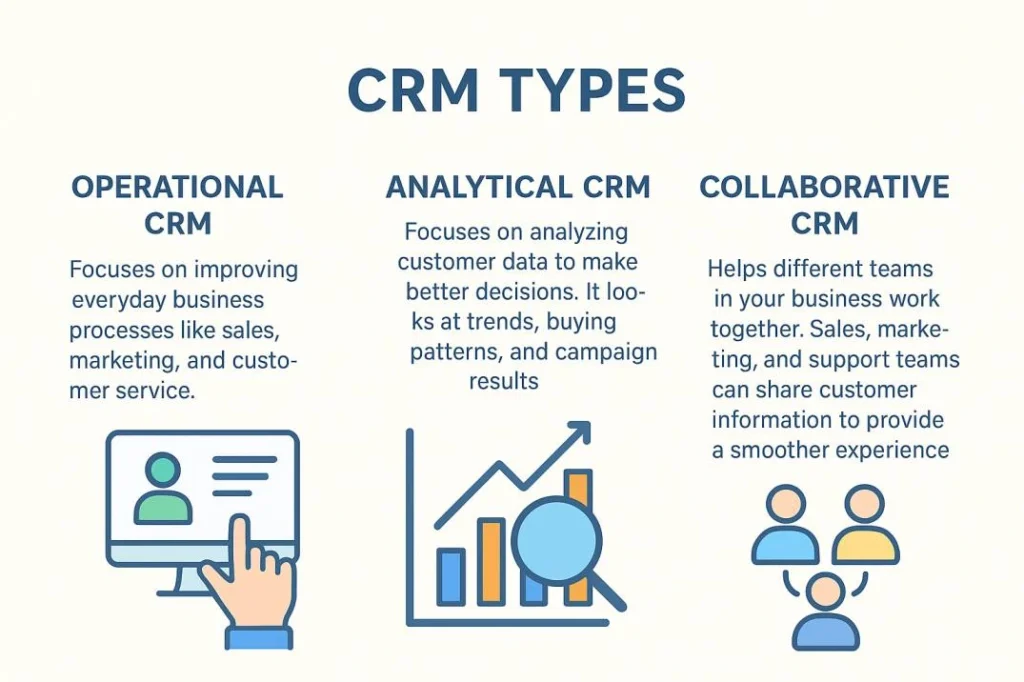
Related Blog: 12 Best Recruitment CRM For Recruitment Agencies
1. Operational CRM
Operational CRM is all about making day-to-day business tasks easier and more efficient.
It focuses on the front-line operations — like sales, marketing, and customer service — that directly interact with customers.
How it works:
- It automates routine tasks such as sending emails, scheduling follow-ups, or managing contacts.
- It tracks every customer interaction, so businesses know who contacted the customer last, what was discussed, and what to do next.
- It helps manage leads and sales pipelines, ensuring no potential customer is forgotten.
Example: Imagine you run an online store. An operational CRM can automatically:
- Send a welcome email to new customers,
- Remind your sales team to follow up on leads,
- And allow your support team to see the full history of a customer’s past orders when handling complaints.
Basically, it keeps everything organized and running smoothly on the customer-facing side of the business.
Related Blog: 10 Best AI ChatGPT Prompts For Recruiters
2. Analytical CRM
Analytical CRM is like the brain of your CRM system — it helps you understand your customers better through data and insights.
How it works:
It collects data from different sources like emails, website visits, purchase history, and social media.
Then it analyzes this data to find patterns and trends, such as:
Which products do customers buy the most?
What kind of promotions work best, or
Which customers are most likely to leave?
Why it’s useful:
It helps businesses make smart, data-driven decisions — not just guesses.
It guides marketing campaigns, product improvements, and customer targeting.
Example: If the CRM shows that most customers buy skincare products during summer, the company can plan seasonal offers or launch new items just before summer starts.
In short, Analytical CRM helps turn customer data into actionable strategies.
Related Blog: Recruitment Software: 7 Top Features That Make Hiring Easy
3. Collaborative CRM
Collaborative CRM is all about teamwork and communication within a company.
It ensures that different departments — like sales, marketing, and customer support — can share customer information easily and work together to give customers a consistent experience.
How it works:
- It creates a shared customer database, so everyone in the company sees the same information.
- Sales can see marketing’s latest campaigns, marketing can check what customers are asking in support, and support can see what promises sales made.
Why it’s useful:
- It reduces miscommunication between departments.
- Customers get a smoother and more personalized experience because every team member knows their full history and needs.
Example: If a customer contacts support about an issue, the support team can instantly see their recent purchase made through the sales team and any discounts offered by marketing. This allows for faster and more accurate help.
Related Blog: The Best Bullhorn Alternative For Effortless Hiring
CRM Trends in 2025
Customer Relationship Management (CRM) is evolving with technology. Here are the top trends for 2025:
1. AI-Powered CRM
Artificial intelligence (AI) helps predict what customers want, suggests the best time to reach out, and recommends products they might like.
2. Omnichannel CRM
Customers use multiple channels like email, phone, social media, and chat. Omnichannel CRM connects all these channels so businesses can provide a consistent experience everywhere.
3. Data Privacy & Security
CRM systems are focusing more on security to protect customer data from leaks, hacks, and misuse.
4. Integration With Other Tools
Modern CRM can integrate with e-commerce platforms, social media, accounting software, and more. This gives a full view of customer interactions in one place.
5. Mobile-First CRM
Remote work and on-the-go teams make mobile-friendly CRMs essential. Employees can update information and respond to customers from anywhere.
How to Choose the Right CRM
Picking the right CRM can be tricky. Here are some simple tips:
- Easy to Use – Your team should be able to learn it quickly.
- Customizable – It should match your business processes.
- Integrations – It should work with the tools you already use.
- Reliable Support – The CRM provider should offer help when needed.
- Scalable – It should grow with your business.
Steps to Implement CRM Successfully
A CRM system is only useful if implemented correctly. Follow these steps:
Step 1:
Set clear goals – Know why you are using CRM. Is it for sales, support, or marketing?
Step 2:
Pick the right system – Choose one that fits your business needs and budget.
Step 3:
Import your data – Transfer customer information into the CRM carefully.
Step 4:
Train your team – Ensure everyone knows how to use it.
Step 5:
Monitor and optimize – Check if it is helping and improve processes regularly.
Common Mistakes to Avoid
Even with CRM, businesses make mistakes. Avoid these:
- Not using all the features of the CRM.
- Using incorrect or outdated data.
- Skipping team training.
- Ignoring personalization.
Benefits of CRM
Using CRM brings many benefits:
- Better organization – All customer information in one place.
- Increased sales – Follow-ups and lead tracking help close more deals.
- Improved support – Quick responses to questions or complaints.
- Stronger relationships – Personal touches make customers feel valued.
- Data insights – Know what works and what doesn’t.
The Future of CRM
CRM is getting smarter every year. Future developments may include:
- Advanced AI – Smarter predictions and automated actions.
- Voice Assistants – Hands-free CRM management using voice.
- Augmented Reality (AR) – Virtual product demos for customers.
- Blockchain – Secure and transparent customer data.
Conclusion
Customer Relationship Management (CRM) is more than just software. In 2025, it’s a way to make customers feel valued, improve sales, and run your business efficiently.
By choosing the right CRM, implementing it carefully, and using it every day, your business can save time, grow revenue, and make customers happier than ever.
Remember: CRM is not just a tool—it’s a way to build lasting relationships that make your business stronger.
FAQs
1. What is CRM in simple words?
Customer Relationship Management is basically the business world’s way of keeping it together. Imagine a super-organized friend who never forgets anyone’s birthday, and somehow knows when you need help before you even ask.
2. What are the three types of CRM?
First up, operational CRM. That’s the workhorse that handles everyday stuff like sales. Then there’s analytical CRM, which is kinda like that friend who overanalyzes every text their ex sent, but for customer data. Last one: collaborative CRM. That’s all about teamwork.
3. What is a CRM tool?
CRM is the software that tracks leads, stashes phone numbers, reminds folks to follow up, and spits out fancy reports on how things are going. Think of names like ATZ CRM.
